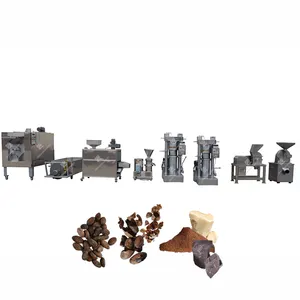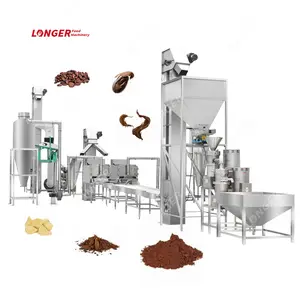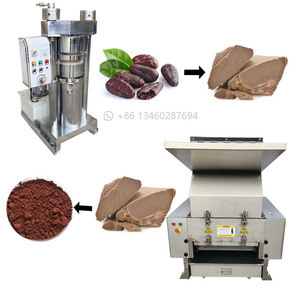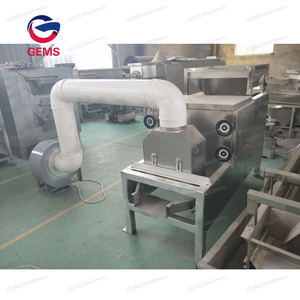(2449 products available)










































































































































































































Machines for processing cocoa beans come in various forms to suit the desired end product. They range in size and capacity, and their pricing reflects these differences. Buyers should consider the machine's functionality when choosing a unit, ensuring it meets their production needs.
Cocoa bean machines include the following:
Cocoa roasters
Cocoa bean roasters are used to roast cocoa beans. Roasting enhances the cocoa flavor and makes it easier to remove the shell. Hand roasters are available for small batches. Larger setups use direct heat or hot air for high volume.
Cocoa cracking machines
Cocoa cracker machines crack roasted cocoa beans into smaller nibs. Manually powered machines are fine for tiny amounts. Electric or large industrial models are better for high-output processing.
Cocoa winnowers
Cocoa winnowers separate nibs from the shells after cracking. Small share winnowers use fans. Large varieties use vibration or water to separate on a big scale.
Cocoa nib grinders
Cocoa nib grinders turn nibs into fine cocoa powder or cocoa butter. Small hand mill grinders are ok for hobby use. Large grinder machines work on a production scale.
Cocoa butter presses
Cocoa butter presses squeeze nibs to extract cocoa butter. Small hand presses work for low output. Large hydraulic or screw presses are suitable for industrial needs.
Cocoa cake and powder machines
Machines make cocoa cake and powder from roasted nibs. Small machines are suitable for producing small amounts. Large systems are designed for industrial production of high quantities.
Cocoa chocolate melanger
A melanger is a machine that combines grinding and mixing. It grinds cocoa nibs and mixes in sugar and other ingredients. Models range from small ones for home use, up to large ones for factories.
The machine's primary purpose is to convert raw cocoa beans into processed items like cocoa powder, cocoa butter, or chocolate. Each model serves specific needs, such as roasting, grinding, or pressing.
More details on each operation:
Roasting
Roasting brings out the cocoa flavor and aroma. It is done using cocoa roasters that roast raw cocoa beans into flavorful roasted cocoa beans.
Cooling
After roasting, beans must cool quickly to avoid overcooking. This is done using cooling trays, coolers, or fans that evenly cool roasted cocoa beans.
Crumbling or cracking
Cracking breaks roasted beans into smaller pieces called nibs. This is done using a cocoa bean cracker machine.
Separation or winnowing
Winnowing removes the outer shells from the nibs. This is done using winnower machines that blow away the light shells, leaving just the heavy nibs.
Grinding
Grinding turns nibs into a paste called cocoa liquor or chocolate liquor. This is done using a nib grinder or melanger machine. Don't Be confused. Cocoa liquor doesn't contain alcohol.
Pressing
Pressing squeezes nibs to separate nibs from cocoa butter. This is done using cocoa butter press machines that apply heavy pressure.
Mixing
During mixing, cocoa liquor, cocoa butter, sugar, and other ingredients are combined. This is done using a cocoa chocolate melanger that mixes and grinds ingredients.
Tempering
Tempering carefully heats and cools chocolate to stabilize cocoa butter. This makes chocolate smooth and prevents white cocoa butter streaks on the bars.
Molding
Molding involves pouring tempered chocolate into molds to create bars or shapes. This is done by pouring tempered chocolate into chocolate molds.
Pressing
Pressing squeezes nibs to separate nibs from cocoa butter. This is done using cocoa butter press machines that apply heavy pressure.
Cocoa processing machines offer several functions that simplify bean processing.
Small and large roasters
There are small roasters for home use and large roasters for business roasting hundreds of kilograms of beans at once, too.
Cracking made easy
Special cracker machines can gently crack the roasted beans without smashing them into tiny bits.
Winnowing machines save time
Winnowing machines blow air to separate the cocoa nibs from the empty shells quickly after cracking.
Grinding to make cocoa butter and powder
Grinding machines can grind nibs into cocoa butter, which is a smooth liquid, or fine powder for cocoa drink mixes.
Press machines do two jobs
Press machines squeeze nibs to get cocoa butter, which is used in cosmetics and health drinks. They also press nibs to make dry cocoa powder used in cookies and cocoa drinks.
Mixers make chocolate bars
Mixer machines combine cocoa butter, sugar, and other ingredients to make smooth chocolate that can be poured into molds to form chocolate bars and shapes.
Cocoa processing machines come in designs tailored to the tasks of roasting, grinding, and mixing the beans. Specialized machines complete each processing step with efficiency.
Winnowers
Winnowers use fans or airflow to separate the nibs from the shells after cracking.
Nib grinders
Nib grinders like melangers use grinding stones to process nibs into smoother pastes.
Chocolate mixers
Mixer machines combine nib paste with sugar and more to create chocolate mixture.
Presses
Press machines use heavy pressure to separate nibs into cocoa butter and dry cocoa powder.
Seed and fan roasters
Small roasters use ideas like seed and fan designs to gently roast small batches evenly.
Factories of all kinds need these machines to produce cocoa products at scale. Chocolate makers, bakers, and candy companies require large processing capacities. Using technology like cocoa bean winnowers and nib grinders speeds up the work.
Chocolate factories
Chocolate factories rely on these machines to process cocoa into chocolate. They mix ground nibs with butter, sugar, and more to create liquid chocolate. Large machines handle huge batches.
Bakeries
Bakeries use cocoa powder made by these machines in cookies, cakes, and brownies. Pressing nibs separates butter for use in recipes too.
Candy companies
Candy companies churn chocolate bars, truffles, and candies. They need machines that can consistently produce the same chocolate each batch.
Food businesses
Restaurants and cafes use cocoa butter in desserts like mousse and cake. It gives recipes a rich texture. They also buy cocoa powder for drinks and baked goods.
Health and beauty companies
Health and beauty companies use cocoa butter in lotions and creams. It moisturizes skin well. They buy press machines that separate nibs from butter in large quantities.
Small businesses
Small businesses also benefit from these machines. They make custom chocolates or sell cocoa products online. Choosing the right size machine is important for their space and budget.
It is important to consider a few key factors to select the best cocoa processing machine for certain needs and for health benefits.
Type of product
The kind of product needed influences the type of machine required. For instance, if cocoa butter is to be extracted, an efficient cocoa butter press machine must be acquired. On the other hand, if just cocoa powder is to be processed, a nib grinder or winnower will be needed.
Maintenance requirements
Maintenance matters, too. Machines with easy cleaning features help processing without much downtime. Also worth looking into is the durability of the machine. Machines made from stainless steel tend to last longer
Budget considerations
A budget is very important. More complex machines, such as having a cocoa butter press and powder machine integrated, will naturally cost more than simple nib grinders.
Capacity needs
It means production needs must be considered, too. Larger machines that handle more cocoa beans at once are suitable for high production. Smaller machines that handle a few hundred grams are ideal for lower production or home use.
Space limitations
Space limitations should also be taken into consideration. Do the machines required have to be fitted into a small room? It is, therefore, important to choose compact machines, like the cocoa winnower, that need little space. Don't forget to consider the ventilation and electrical needs of the machines, too.
Assess product needs
Assessing the products desired at the end of the process helps select the machines required. If creamy chocolate is desired, a cocoa nib grinder and mixer combination is needed. If just cocoa butter or cocoa powder is desired, separate machines can do the processing.
What are common materials used in making cocoa processing machines?
Cocoa processing machines are primarily composed of stainless steel. This material is easy to clean, which makes it ideal for food processing. Other components may be made from steel, aluminum, or high-strength plastics. These materials are used in the areas that require different levels of durability depending on the specific machine's function.
What is the difference between natural and alkalized cocoa powder?
Natural cocoa powder has an intense chocolate flavor. It is made from ground cocoa nibs and is slightly acidic. It has a more robust chocolate taste. Alkalized cocoa powder undergoes treatment with alkaline solutions. It neutralizes acidity and darkens the powder's color. It has a milder, less intense flavor and is less bitter and more neutral in acidity.
What is the difference between Dutch-processed and raw cocoa powder?
Dutch-processed cocoa powder is treated with an alkaline solution to reduce bitterness and acidity. It has a mellow, less acidic taste and a darker color. Raw cocoa powder is made from cold-pressed nibs. It retains cocoa’s natural acidity, which maintains its rich, intense chocolate flavor. It is more bitter and lighter in color than Dutch-processed cocoa powder.
What are the advantages of investing in a cocoa processing machine?
Processing machines make the processing of the beans more effective and help save time. They are capable of producing cocoa powder, cocoa butter, or chocolate. They increase production capabilities. They also provide more consistent results, which means better quality cocoa products.
Can a machine for processing cocoa beans be used for other nuts?
Some parts of the cocoa processing machines can be used for other nut processing. These include the nib grinder, the cocoa butter press, and the cocoa powder mixer.